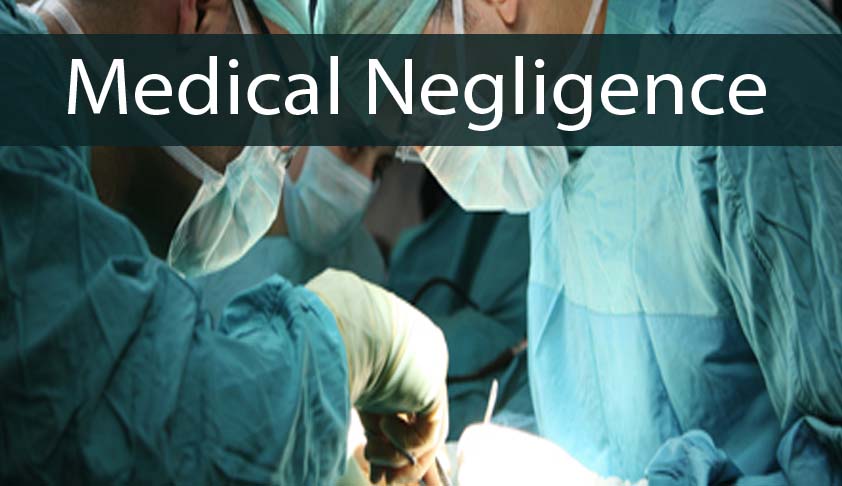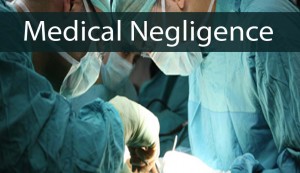In this blog post, Disha Pareek, a student of Rajiv Gandhi National University of Law, Punjab, writes about Medical negligence and the concerned laws. The post is an analytical study on medical negligence in the context of Torts, Criminal Law, and Consumer Protection Act, 1986 and lastly, the post gives suggestions regarding the same.
It is very difficult to define negligence categorically since there is no consensus upon this; however, it is a highly debatable topic in the jurisprudence of Tort. As per Moni v. State of Kerala [1] “In the case of medical man, negligence means failure to act by the standards of reasonably competent medical men at the time. There may be one or more perfectly proper standards, and if he conforms to one of these proper standards, then he is not negligent.” Therefore, it involves three constituents of negligence:
(1) A legal duty of the party complained of to exercise due care towards the party complaining the former’s conduct within the scope of his duty;
(2) Breach of the said duty; and
(3) Consequential damage that follows
Lately, Indian society has developed an awareness regarding their rights and public awareness about medical negligence is growing. The reason is that the degrading standards of professional competence, facilities, and the appropriateness of their therapeutic and diagnostic methods. In earlier times, people were afraid of suing doctors or hospitals, but with the passage of time, the law has played a major role in generating awareness among people regarding their rights.
The situation can be traced from certain cases[2] which dealt with seeking of redressal by the patients for damages suffered by them due to the negligence of doctors and also cases involving a breach of confidentiality arising from doctor-patient relationship. In the case of medical negligence, the doctor will be held liable for certain medical malpractices.
Nature of medical negligence
In the Tort of Negligence, professionals such as lawyers, architects and doctors are included in the category of persons who profess some special type of skill or are skilled persons. Therefore, the person performing should possess the requisite skill to do the work. Similarly, the patients, as soon as they step into the premises of the hospital, they equate the doctor to God and believe that he possess the requisite medical expertise.[3] Here, the standard to be applied to adjudge the case at hand would be that of an ordinary competent person exercising ordinary skill in the profession.
Position in UK
According to Bolam’s test, a doctor, who acts by a practice accepted as proper by a responsible body of medical men,[4] is not negligent mainly because there is a body of opinion that takes a contrary view. [5] But the test came under a rough weather and was faced with a lot of criticism, and therefore, countries like Australia rejected it altogether.
As of the present, after the Bolitho case[6], recognition of a two-step procedure took place so as to determine the question of alleged medical negligence:
- Whether the doctor acted by a practice accepted as proper by an ordinarily competent doctor.
- If yes, whether the practice survived Bolitho judicial scrutiny as being responsible or logical.[7]
The two-step analysis as followed in the Bolitho case was reiterated and confirmed in many cases, like French v. Thames Valley Strategic H.A.[8] Unlike the Bolam Test, this test is uncontroversial.[9]
Position in India
Legal framework in India
The legal framework in India that affects the medical profession and its working, and which prevents malpractices holds an important place.
- Fundamental Rights
- Article 21
- Article 32
- Directive Principle of State Policy
- Article 41
- Article 42
- Article 47
- Indian Penal Code (IPC)
- Section 52
- Section 80
- Section 81
- Section 88
- Section 90
- Section 92
- Section 304-A
- Section 337
In the context of Indian law, medical negligence comes under 3 categories; Criminal negligence, civil negligence and negligence under Consumer Protection Act. Different provisions regarding the remedy in the form of punishment and compensation are there in 3 laws. The following is an analytical comparison of the laws mentioned above about medical negligence.

Criminal law and medical negligence
Indian criminal Law has placed the medical professional on a different footing as compared to an ordinary human. Section 304A[10] of the Indian Penal Code of 1860 states that “whoever causes the death of a person by a rash or negligent act not amounting to culpable homicide shall be punished with imprisonment for a term of two years, or with a fine or with both.”
Thus, when a person engaged in the commission of an offence within the meaning of IPC and causes death by rashness or negligence, but without either intending to cause death, or thinking it likely that he shall cause that, he should be liable for the punishment of the offence which he was engaged in committing added to the ordinary punishment of involuntary culpable homicide.[11]
Criminal liability can also be imposed upon a doctor under particular situations wherein the patient dies during the time of administering anaesthesia in an operation; the death must also be due to malicious intention or gross negligence.[12] Many a time the doctor will also be responsible vicariously, meaning thereby if his employee/servant rashly causes the death of a patient. In that case, the employee as well the doctor will be liable due to the principle of ‘Vicarious Liability’ under Tort law.
Despite the rights of a patient mentioned above, there are a few exceptions as well.[13] Sections 80 and 88 of the Indian Penal Code contain defences for doctors accused of criminal liability. Under Section 80[14] (Accident in doing a lawful act) ‘nothing is an offense that is done by accident or misfortune and without any criminal intention or knowledge in the doing of a lawful act in a lawful manner by lawful means and with proper care and caution.’ According to Section 88,[15] ‘a person cannot be accused of an offense if she/ he performs an act in good faith for the other’s benefit, does not intend to cause harm even if there is a risk, and the patient has explicitly or implicitly given consent.’
Consumer Protection Act and criminal negligence
Since 1990’s there is a huge speculation and debate on whether medical services are explicitly or categorically included in the definition of “Services” as enshrined under Section 2(1)(o) of the Consumer Protection Act (CPA). Deficiency of service[16] means any fault, imperfection, shortcoming, or inadequacy in the quality, nature, or manner of performance that is required to be maintained by or under any law for the time being in force or has been undertaken to be performed by a person in pursuance of a contract or otherwise about any service.
The question that comes to mind is that where can a complaint be filed; the answer is that, a complaint can be filed in[17]-:
1) The District Forum if the value of services and compensation claimed is less than 20 lakh rupees,
2) Before the State Commission, if the value of the goods or services and the compensation claimed does not exceed more than 1 crore rupees, or
3) In the National Commission, if the value of the goods or services and the compensation exceeds more than 1 crore rupees.
The good positive aspect about this is that there is a minimal fee for filing a complaint before the District Consumer Redressal Forums.
n 1995, the Supreme Court decision in Indian Medical Association v. VP Shantha[18] brought the medical profession within the ambit of ‘service’ defined in the Consumer Protection Act, 1986. This defined the relationship between patients and medical professionals by giving contractual patients the power to sue doctors if they sustained injuries in the course of treatment in ‘procedure free’ consumer protection courts for compensation.
Civil law and medical negligence
The position regarding negligence under civil law is very important as it encompasses many elements within itself. Under the torts law or civil law, this principle is applicable even if medical professionals provide free services.[19] It can be asserted that where Consumer Protection Act ends, tort law begins.
In cases where the services offered by the doctor or the hospital do not fall within the meaning of ‘services’ as defined under CPA, patients can take recourse to tort law under negligence and claim compensation. Here, the onus (burden) of proof is on the patient, and he has to prove that because of doctor’s or the hospital’s negligent act, he suffered injury thereby.
Such cases of negligence may include transfusion of blood of incorrect blood groups, leaving a mop in patient’s abdomen after the operation, removal of organs without consent and administering wrong medicine resulting in injury.[20] Persons who offer medical advice and treatment implicitly state that they have the skill and knowledge to do so, that they have the skill to decide whether to take a case, to decide the treatment, and to administer that treatment. This is known as an “implied undertaking” on the part of a medical professional.
In the case of the State of Haryana v. Smt Santra,[21] the Supreme Court held that every doctor “has a duty to act with a reasonable degree of care and skill.” However, since no human is perfect and even the most renowned specialist can commit a mistake in diagnosing a disease, a doctor can be held liable for negligence only if one can prove that she/ he is guilty of a failure that no doctor with ordinary skills would be guilty of if acting with reasonable care.[22] An error of judgement constitutes negligence only if a reasonably competent professional with the standard skills that the defendant professes to have, and acting with ordinary care, would not have made the same error.[23]
Certain conditions must be satisfied before liability can be considered. The person who is accused must have committed an act of omission or commission; this act must have been in breach of the person’s duty, and this must have caused harm to the injured person. The complainant must prove the allegation against the doctor by citing the best evidence available in medical science and by presenting an expert opinion.[24] The question of degree has always been relevant for distinguishing negligence under the civil and criminal law. In Kurban Hussein v. the State of Maharashtra,[25] in the case concerning Section 304 (A) of I.P.C., 1860, it was stated that-
“To impose criminal liability under Section 304-A, it is necessary that the death should have been the direct result of rash and negligent act of the accused, without other person’s intervention.”[26]
Landmark judgements
The judgment that clicks our mind whenever we think about medical negligence is none other than the high-profile case in which the highest compensation till date was granted, in the case of Kunal Saha v. AMRI (Advanced Medical Research Institute)[27] which is popularly known as Anuradha Saha case,. The case was filed back in 1998 with the alleged medical negligence by 3 doctors of AMRI hospital; Dr. Sukumar Mukherjee, Dr. Baidyanath Haldar, and Dr. Balram Prasad as well as AMRI hospital.
The facts of the case, simply speaking, are that there was a drug allergy from which Mrs. Saha was suffering. When the duo approached the concerned hospitals, the three doctors prescribed such medicine which further aggravated the condition of the woman which led to her death. The Apex Court (Supreme Court) gave the final verdict of the case in the year 2013 and also compensated the victim with 6.08 crore. This particular case expanded the scope of medical negligence in India and took it to a whole new level.
In the case of V. Krishna Rao v. Nikhil Super Speciality Hospital 2010, Krishna Rao, an officer in malaria department filed a complaint against the hospital for negligent conduct in treating his wife. His wife was wrongly treated for typhoid fever instead of malaria fever, due to the wrong medication provided by the hospital. Finally, the verdict was given, and Rao was awarded a compensation of Rs 2 lakhs. In this case, the principle of res ipsa loquitor (legal principle for a ‘thing speak for itself’) was applied, and the compensation was given to the plaintiff.
In a popular case, Achutrao Haribhau khodwa and Ors v. the State of Maharashtra,[28] the Supreme Court noticed that in the very nature of the medical profession, skills differ from doctor to doctor, and there is more than 1 admissible course of operation. Therefore, negligence cannot be attributed to a doctor so long as he is performing his duty with due care, caution, and attention. Merely because the doctor chooses one course of action over other, he won’t be liable.
Conclusion and Suggestion
There are a few criticisms staring in the face of the Indian laws on medical negligence. The foremost is the principle of ‘Burden of Proof’. The burden of proof is on the plaintiff. So, if a patient alleges malpractice in medical, the law will require a higher standard of evidence to support it. Here, for an ordinary human or a patient, it becomes very difficult to determine the exact damage and the causal relation between the injury and the fault of the doctor.
Resultantly, the patient is not able to prove doctor’s fault beyond a reasonable doubt, since, the field of medicine is unexpected and unpredictable and anytime anything can happen in a human body and so, it reverts to the plaintiff. Therefore, it is high time that the laws dictating upon the medical negligence get changed so as to suit patients first. And the patients should be sensitized regarding their rights against medical malpractices by civil societies through a proper education channel.
To quote Mahatma Gandhi, “It is health that is a person’s real wealth and not pieces of gold and silver”. So as a moral obligation All the concerned authorities whether it is the hospital, Government, Medical Council or any other institution working towards betterment of healthcare facilities should work together and take steps to provide:
- Quality healthcare
- Adequate healthcare
- Accessibility of basic health care
Footnotes:
[1] SA. No. 832 of 2000(G)
[2] Available at, https://indiankanoon.org/doc/34613760/
[3] D.K. Sharma, Hospital Administration and Human Resource Management, Ed 6, PHI Learning Pvt. Ltd 2003.
[4] Warren Jones, Law & Ethics, British Dental Journal, 11 March 2000
[5] Sideway v Board of Governors of the Bethlem Royal Hospital [1985] 1 All Whitehouse v Jordan (1981) 1 WLR 246 and Maynard v West Midland Regional Health Authority (1984) 1 WLR 634.
[6] Bolitho v. City and Hackney Health Authority, [1996] 4 ALL ER 771.
[7] Mulheron, Rachael. “TRUMPING BOLAM: A CRITICAL LEGAL ANALYSIS OF BOLITHO’S “GLOSS.”” The Cambridge Law Journal 69.03 (2010): 609-638.
[8] [2005] EWHC 459 (Q.B.), at [9]-[10].
[9] Kingsberry v. Greater Manchester Strategic H.A. [2005] EWHC 2253.
[10] Section 304-A, Indian Penal Code, 1860
[11] Shiva Ram v. The State, AIR 1965 ALL 196
[12] Available at http://lawcommissionofindia.nic.in/reports/rep196.pdf
[13] O.P. Verma, “Doctors Heave a Sigh of Relief” Deccan Herald, Sunday, August 15, 2004
[14] Section 80, Indian Penal Code, 1860
[15] K K S R Murthy, ‘Medical Negligence and the Law’ Indian Journal of Medical Ethics, Vol 4, No 3, (2007)
[16] Section 2(1), Consumer Protection Act, 1986
[17] Available at http://www.delhistatecommission.nic.in/filing_procedure.htm
[18] Indian Medical Association v. V P Shantha AIR 1996 SC 550: (1995) 6 SCC 651
[19] Smreeti Prakash, ‘A Comparative Analysis of various Indian legal system regarding medical negligence.’
[20] Talha Abdul Rahman, “Medical Negligence and Doctor’s Liability”, Indian Journal of Medical Ethics, April-June, 2005
[21] AIR 2000 SC 3335
[22] Observations of Lord President Clyde in Hunter v. Hanley (1955) SLT 213
[23] Whitehouse v. Jordan, (1981) 1 ALL ER 267 the House of Lords
[24] Dr. Lakshman Balkrishna Joshi v. Dr. Trimbak Bapu Godbole, AIR 1969 (SC) 128.
[25] (1965) 2 SCR 622
[26] Sir Lawrence Jenkins in Emperor v. Omkar Rampratap, 4 BOM LR 679
[27] (2006) CPJ 142 NC.
[28] (1996) 2 SCC 634.
 Serato DJ Crack 2025Serato DJ PRO Crack
Serato DJ Crack 2025Serato DJ PRO Crack














 Allow notifications
Allow notifications



मेरी बेटिया को लेप्सी (मिर्गी) के दौरे
[…] Must Read: Medical Negligence and law in India- An Analysis […]
[…] Medical Negligence And Law In India – An Analysis […]